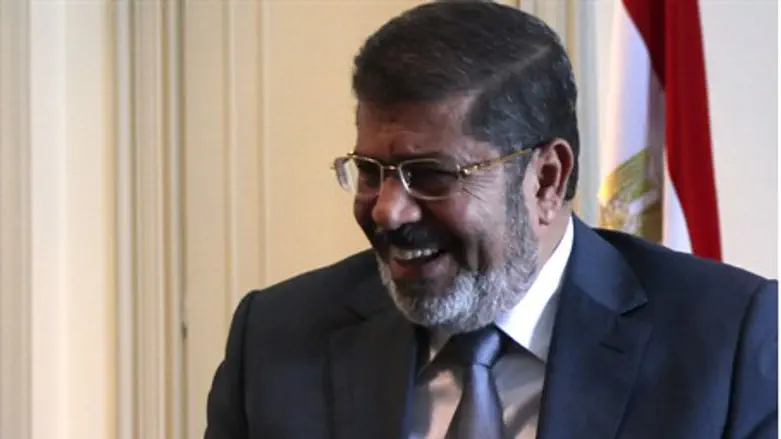
On the eve of his first trip to the United States as Egypt’s new Islamist president, Mohammed Morsi said the United States needed to fundamentally change its approach to the Arab world, showing greater respect for its values and helping build a Palestinian state, if it hoped to overcome decades of pent-up anger.
In a 90-minute interview with The New York Times on Saturday, Morsi said it was up to Washington to repair relations with the Arab world and to revitalize the alliance with Egypt, long a cornerstone of regional stability.
If Washington is asking Egypt to honor its treaty with Israel, he said, Washington should also live up to its own Camp David commitment to Palestinian self-rule. He said the United States must respect the Arab world’s history and culture, even when that conflicts with Western values.
Morsi dismissed criticism from the White House that he did not move fast enough to condemn protesters who recently climbed over the United States Embassy wall in Cairo and burned the American flag in anger over a video that mocked the prophet Mohammed.
“We took our time” in responding to avoid an explosive backlash, he said, but then dealt “decisively” with the small, violent element among the demonstrators.
“We can never condone this kind of violence, but we need to deal with the situation wisely,” he said, noting that the embassy employees were never in danger.
Morsi, who will travel to New York on Sunday for a meeting of the United Nations General Assembly, told The New York Times that the United States should not expect Egypt to live by its rules.
“If you want to judge the performance of the Egyptian people by the standards of German or Chinese or American culture, then there is no room for judgment,” he said. “When the Egyptians decide something, probably it is not appropriate for the U.S. When the Americans decide something, this, of course, is not appropriate for Egypt.”
He suggested that Egypt would not be hostile to the West, but would not be as compliant as former President Hosni Mubarak was either.
“Successive American administrations essentially purchased with American taxpayer money the dislike, if not the hatred, of the peoples of the region,” he said, by backing dictatorial governments over popular opposition and supporting Israel over Palestinian Authority Arabs.
When asked if he considered the United States an ally in the wake of recent comments by President Barack Obama who said he did not consider Egypt an ally but did not consider it an enemy,. Morsi answered in English, “That depends on your definition of ally.”
He said he envisioned the two nations as “real friends.”
Morsi praised Obama for moving “decisively and quickly” to support the Arab Spring revolutions, and he said he believed that Americans supported “the right of the people of the region to enjoy the same freedoms that Americans have.”
Arabs and Americans have “a shared objective, each to live free in their own land, according to their customs and values, in a fair and democratic fashion,” he said, adding that he hoped for “a harmonious, peaceful coexistence.”
At the same, he also argued that Americans “have a special responsibility” for PA Arabs because the United States had signed the 1978 Camp David accord which called for the withdrawal of Israeli troops from Judea and Samaria and Gaza to make way for full Palestinian self-rule.
“As long as peace and justice are not fulfilled for the Palestinians, then the treaty remains unfulfilled,” he said.
Morsi made no apologies for his roots in the Muslim Brotherhood, saying, “I grew up with the Muslim Brotherhood. I learned my principles in the Muslim Brotherhood. I learned how to love my country with the Muslim Brotherhood. I learned politics with the Brotherhood. I was a leader of the Muslim Brotherhood.”
He left the group when he took office but remains a member of its political party. But he said he sees “absolutely no conflict” between his loyalty to the Brotherhood and his vows to govern on behalf of all, including members of the Christian minority or those with more secular views.
“I prove my independence by taking the correct acts for my country,” he said. “If I see something good from the Muslim Brotherhood, I will take it. If I see something better in the Wafd” — Egypt’s oldest liberal party — “I will take it.”
He repeatedly vowed to uphold equal citizenship rights of all Egyptians, regardless of religion, sex or class, while standing by the religious arguments he once made as a Brotherhood leader that neither a woman nor a Christian would be a suitable president.
